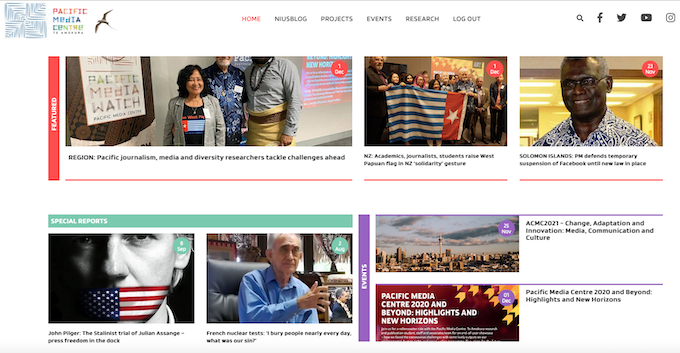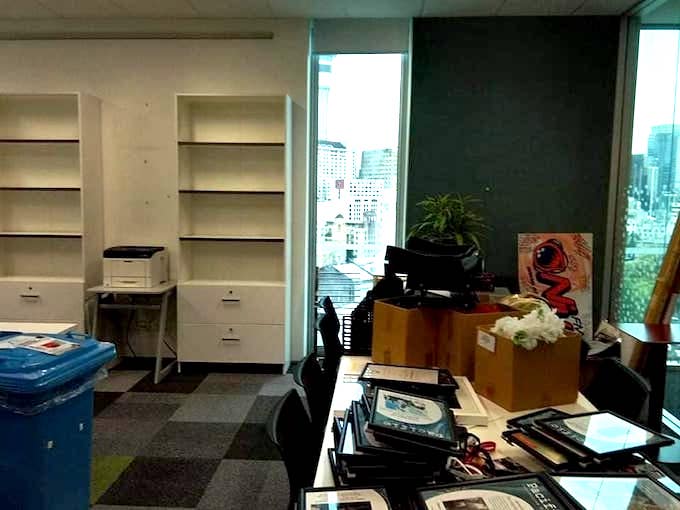By Justin Wong in Auckland
Auckland University of Technology has denied it is sidelining the Pacific Media Centre in the School of Communication Studies, but it is yet to announce the new leadership following disputes over office space and a succession plan.
The multi-disciplinary research and professional development unit was founded in 2007 by Professor David Robie with a focus on Pacific media research and producing stories of marginalised communities in New Zealand and the Asia-Pacific region.
The centre also housed several outlets that provided journalists covering regional issues and Pasifika researchers a space to publish their work, such as the academic journal Pacific Journalism Review and the award-winning Pacific Media Watch.
Dr Robie retired last December as the centre’s director but the position was not filled immediately. There have been no updates from the PMC’s website, YouTube and Soundcloud channels since, while Southern Cross, the weekly radio segment produced by the PMC on 95bFM’s The Wire at Auckland University has not had a new episode since last August.

Only one month after his retirement, Dr Robie was told that the PMC’s office on the 10th floor of the WG Building had been emptied of its awards, theses, books and other memorabilia, with people involved with the centre not being notified or consulted about the move.
The Pacific Newsroom reported that the contents, including a traditional carved Papua New Guinean storyboard presented by then Pacific Island Affairs Minister Luamanuvao Dame Winnie Laban to celebrate the centre’s opening in October 2007, had been removed “with the lack of a coherent explanation from AUT”.
Dr Robie told Debate in April that there was a gap between what was said by AUT and “reality”, saying that the office being cleared out affirmed a lack of commitment by the university for the PMC’s future.
He also said a succession plan drawn up several years ago that had involved “headhunting” possible successors before his sabbatical in 2019 so the candidate could familiarise themselves with the role before formally taking over, but AUT did not follow through on this.

‘Opportunity wasted by the school’
“This opportunity was wasted by the school and by the time I left, nobody had been prepared for continuity and the very able and talented people still working hard for the centre were not given support,” he said.
“This is unconscionable in my view.
“The school needs to listen to the vision of the stakeholders and treat them with respect.”
The move was also criticised by journalists and academics, with the influential Sydney-based Australia Asia Pacific Media Initiative (AAPMI) advocacy group calling on AUT’s vice-chancellor Derek McCormack in an open letter in February to ensure that the PMC would continue to be developed “at a time when Pacific journalism is under existential threat”.
Meanwhile, Dr Camille Nakhid, the chair of the PMC’s advisory board and an associate professor in AUT’s School of Social Sciences and Public Policy, told The Spinoff that she believed the PMC directorship should be advertised externally to “attract a range of qualified candidates”.
Dr Rosser Johnson, the head of AUT’s School of Communications Studies, told Debate at the end of April that the office “relocation” was due to security reasons and the PMC’s “new space” on the 12th floor of the WG Building has “twice as much office space” for students and affiliate researchers.
The new PMC leadership had been expected to be announced in April, but has been again delayed.
‘Expensive specialist gear’
“There’s one department who uses specialist gear that is very expensive and we have a very high level of risk around that gear,” Dr Johnson said.
“We had to consider the space that the Pacific Media Centre was in because it can be made secure through two sets of security doors.”
The school also scheduled two faculty and school-wide planning days to talk with people who would be affected.
Dr Johnson said the School had opted for an expression of interest approach within the department to fill Dr Robie’s position because the original plan did not follow protocol. An external hiring freeze imposed by AUT last year and the part-time nature of the PMC’s directorship meant the school preferred to look internally.
“David [Robie] was asking if it was possible for us to shoulder-tap two or three people to be co-directors but the School is supposed to have a transparent process where everyone who wants to be considered can be considered.
“If you want to grow and develop a research culture, it makes sense to look internally first.”
Dr Johnson also said he respected the care and commitment Dr Robie had towards the PMC, but insisted the school had no intention to shape the centre’s future direction, as the responsibility would fall on the next director.
Justin Wong is a postgraduate student journalist at AUT. He is also the student news reporter at AUT’s Debate magazine and the presenter of The Wire on student radio station 95bFM at the University of Auckland. This article is republished with permission from Debate.
This content originally appeared on Asia Pacific Report and was authored by Pacific Media Watch.
This post was originally published on Radio Free.